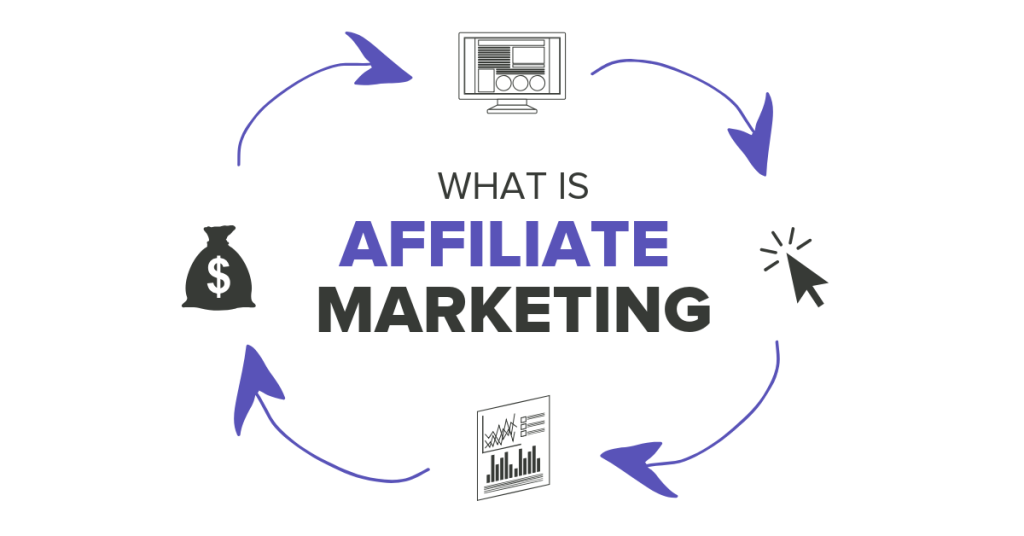
What Is Affiliate Marketing? is evolving rapidly, transforming how businesses drive revenue and acquire customers. With AI-driven automation, social commerce, and shifting commission structures, business leaders must adapt to stay competitive.
Platforms like TIKTOK, YouTube, and Instagram are reshaping affiliate marketing strategies, while search engine updates and new attribution models impact visibility and payouts. At the same time, affiliate networks are refining commission structures and implementing advanced tracking technologies, making it essential for brands to optimize their partnerships.
This article explores the biggest trends shaping affiliate marketing in 2025, from leveraging social media to maximizing SEO and high-converting landing pages. Whether you’re a business owner, marketing executive, or e-commerce leader, understanding these changes will help you refine your strategy, build stronger affiliate relationships, and drive sustainable growth.
Stay ahead of the competition by learning how to position your business for long-term success in the evolving affiliate landscape.
- What is affiliate marketing?
- How affiliate marketing is evolving
- The benefits of implementing an affiliate marketing strategy
- Top 4 affiliate marketing platforms in 2025
- How to boost affiliate marketing in your company in 2025?
- Measuring your affiliate marketing strategy success
- The future of affiliate marketing is now
- Affiliate marketing FAQ: What businesses need to know
- Conclusion

Affiliate marketing is a type of digital marketing where individuals or businesses earn commissions by promoting products or services from another company.
Affiliates – such as bloggers, content creators, and website owners – use unique tracking links to drive traffic and generate sales for a retailer or brand. When a sale or action occurs through their link, they receive a payout based on the agreed commission model.
There are several ways affiliates can get paid, each offering different benefits and structures:
- Cost per action (CPA). Affiliates earn a commission when a specific action is completed, such as a purchase, sign-up, or form submission. This model is widely used in affiliate marketing campaigns.
- Pay-per-click (PPC). Affiliates are paid based on the number of clicks they generate, regardless of whether a sale is made. This model is less common but can be beneficial for driving traffic.
- Revenue-sharing. Also known as cost per sale (CPS), this model pays affiliates a percentage of the total sale amount. It is the most popular model in the affiliate marketing business and is commonly used for product reviews, email marketing, and long-term marketing efforts.
Affiliate marketing success depends on multiple factors, including commission rates, tracking accuracy, and the right affiliate manager to oversee payouts. With the right strategies, affiliates can build a sustainable online business and create successful affiliate partnerships.
How affiliate marketing is evolving

Affiliate marketing is expected to undergo significant changes in 2025, driven by advancements in technology, shifts in consumer behavior, and evolving digital marketing strategies. As competition grows and marketing efforts become more sophisticated, affiliates will need to adapt to stay ahead.
Several key trends will shape the future of affiliate marketing:
• AI-driven automation. Artificial intelligence will play a larger role in content creation, campaign optimization, and predictive analytics, helping affiliates improve targeting and efficiency.
• Enhanced attribution models. Improved tracking and multi-touch attribution will provide better insights into customer journeys, ensuring affiliates receive fair payouts for their contributions.
• The rise of micro-influencers. Brands are increasingly partnering with niche content creators and micro-influencers to build more authentic and effective affiliate marketing campaigns.
• Shifting commission structures. Companies may adjust commission rates and payout models to balance profitability and attract high-performing affiliates.
• Privacy and data changes. Stricter data privacy regulations and the phase-out of third-party cookies will push affiliate marketers to adopt first-party data strategies and more transparent tracking methods.
These trends will impact how affiliate marketing works, requiring businesses to rethink their digital marketing approaches. Affiliates must focus on optimization, diversify their marketing channels, and build strong affiliate partnerships to remain competitive and align with the future of online business.
The rise of social media-driven affiliate sales
Social media is becoming one of the most powerful marketing channels for affiliate sales, with platforms like TikTok, YouTube, and Instagram driving significant traffic and conversions. As consumer behavior shifts toward short-form content and interactive shopping experiences, affiliate marketing strategies should adapt to these trends.
Key platforms shaping the future of social media-driven affiliate sales include:
- Tiktok. The rise of short-form videos and viral trends makes tiktok an essential platform for promoting affiliate products through influencer collaborations and native shopping features.
- YouTube. With its long-form content and strong search functionality, YouTube is a key platform for product reviews, tutorials, and evergreen affiliate marketing content.
- Instagram. Features like Instagram Reels, Stories, and in-app shopping make it a prime channel for content creators to drive affiliate product sales through engaging, visual content.
Influencer partnerships are playing an increasingly important role in affiliate marketing. Brands are collaborating with content creators who have highly engaged audiences to promote products in a more authentic and trusted way.
Short-form videos, live shopping, and interactive content are proving to be effective tools for increasing conversion rates and maximizing affiliate earnings. Marketers who adapt their strategies to focus on these trends will have a competitive advantage in 2025.
The future of SEO in affiliate marketing

As search engine algorithms evolve, affiliate marketers must stay ahead of SEO trends to maintain visibility and drive affiliate sales in 2025.
Search engines are becoming smarter, prioritizing high-quality, user-focused content over keyword stuffing and outdated optimization tactics. This shift means that affiliate sites need to focus on delivering valuable, relevant, and well-structured content to rank higher in search results.
Key SEO trends shaping affiliate marketing in 2025 include:
- AI-powered search. Search engines are using AI to gain a better understanding of user intent, making it essential for affiliate websites to create content that answers specific questions and provides value.
- Voice search optimization. With the rise of voice assistants, optimizing content for conversational queries will help affiliate sites rank for long-tail keywords.
- Content marketing strategies. High-quality, informative content remains a key ranking factor. Affiliate marketers must focus on long-form articles, product comparisons, and detailed reviews.
- User experience (UX) improvements. Google continues to prioritize page speed, mobile-friendliness, and overall site functionality in search rankings.
- WordPress and structured data. Many affiliate websites run on WordPress, making it important to leverage structured data, schema markup, and SEO-friendly plugins to enhance search engine visibility.
- Strategic link building. High-quality backlinks are crucial for affiliate websites. Successful marketers focus on authentic relationship building, relevant guest posting, and proper UTM parameter implementation to track traffic sources and campaign effectiveness across multiple channels.
Affiliate marketers who prioritize SEO best practices will see stronger organic traffic, leading to more affiliate sales and higher commissions in 2025.
The benefits of implementing an affiliate marketing strategy
Affiliate marketing offers numerous advantages for businesses looking to expand their reach and increase revenue without significant upfront costs. Here are the key benefits that make it an attractive strategy for organizations of all sizes:
- Cost-effective customer acquisition
- Expanded market reach
- Enhanced brand awareness.
- Improved search engine visibility
- Risk mitigation.
- Measurable ROI
Top 4 affiliate marketing platforms in 2025
Affiliate marketers have a wide range of platforms to choose from, each offering different commission structures, product types, and earning opportunities. Whether promoting physical products, digital services, or subscription-based offers, selecting the right affiliate marketing program is key to maximizing earnings. Some of the most popular programs include:




How to boost affiliate marketing in your company in 2025?
Implementing an effective affiliate marketing strategy requires a structured approach to maximize ROI and integrate smoothly with your existing marketing channels. For business executives and marketing leaders looking to enhance their company’s affiliate program, here’s a strategic roadmap:
- Establish clear program objectives
- Select the right affiliate platform.
- Develop competitive commission structures.
- Create affiliate-ready assets.
- Implement robust tracking systems.
- Build strategic affiliate relationships.
- Integrate with existing marketing channels.
Measuring your affiliate marketing strategy success
Effectively measuring the performance of your affiliate marketing program is essential for optimizing ROI and making data-driven decisions. Here are the key metrics that marketing leaders should track to evaluate their affiliate strategy’s effectiveness:
- Conversion rate.
- Average order value (AOV)
- Cost per acquisition (CPA)
- Return on ad spend (ROAS)
- Customer lifetime value (CLV)
- Active affiliate ratio.
- Traffic quality indicators
- Attribution analysis
- Mobile vs. desktop performance
The future of affiliate marketing is now
Affiliate marketing in 2025 will be shaped by evolving technology, shifting consumer behaviors, and new digital marketing strategies. Social media will play a more significant role in driving affiliate sales, while SEO and landing page optimization will remain critical for success for both affiliate partners and marketers.
Affiliate marketing FAQ: What businesses need to know
Below are answers to some of the most frequently asked questions about the future of affiliate marketing.
- What is Affiliate Marketing?
- How Does Affiliate Marketing Work?
- What Types of Businesses Can Benefit from Affiliate Marketing?
- What Are the Key Benefits of Affiliate Marketing for Businesses?
- How Do I Choose the Right Affiliates for My Business?
- How Do I Track Affiliate Performance?
- What Commission Models Are Common in Affiliate Marketing?
- How Can I Set Up an Affiliate Program for My Business?
- What Are Common Mistakes to Avoid in Affiliate Marketing?
- How Can I Ensure the Success of My Affiliate Program?
Affiliate marketing in 2025 is set to be more dynamic, data-driven, and integrated with emerging digital trends than ever before. Businesses that embrace AI-powered automation, leverage social commerce, and adapt to evolving SEO and attribution models will gain a competitive edge. As platforms likeTikTok, YouTube, and Instagram continue to dominate digital engagement, marketers must focus on short-form content, influencer partnerships, and interactive shopping experiences to maximize affiliate sales.
Additionally, the rise of privacy regulations and the decline of third-party cookies will push brands to prioritize first-party data and transparent tracking solutions. To succeed in this evolving landscape, companies must establish clear objectives, refine commission structures, and build strong affiliate relationships.
By staying ahead of trends, optimizing marketing strategies, and leveraging advanced technologies, businesses can harness the full potential of affiliate marketing to drive sustainable growth, improve customer acquisition, and increase revenue in the digital economy. The future of affiliate marketing is here, and those who innovate and adapt will thrive

